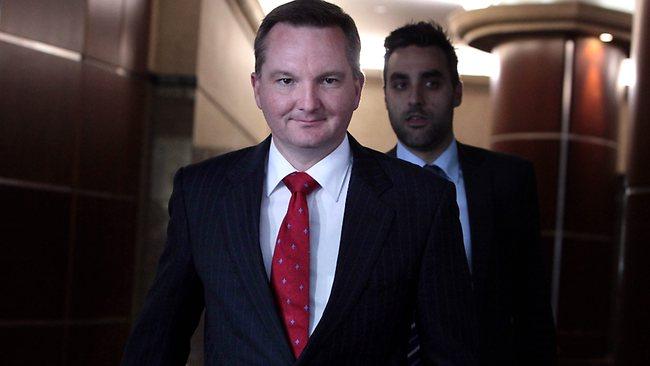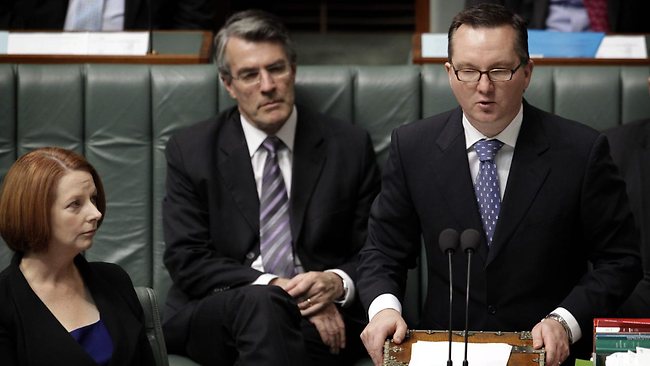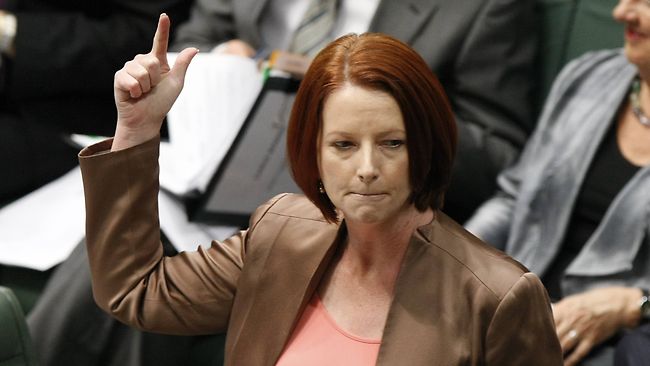Labor can't run class war as Rinehart deal unfuriates unions
IMMIGRATION Minister Chris Bowen has infuriated Julia Gillard and union leaders with a deal that lets Gina Rinehart import 1700 foreign workers.

IMMIGRATION Minister Chris Bowen has infuriated Julia Gillard and the nation's most powerful union leaders after granting Gina Rinehart, the world's richest woman, the right to import 1700 foreign workers for a massive West Australian iron ore project.
The scathing reaction from the unions over the decision to favour the mining magnate - while the government conducts a class war campaign against mining billionaires and vested interests to sell its "working families" budget - has exposed new divisions in the cabinet amid growing concerns about Julia Gillard's leadership.
As union leaders met the Prime Minister in Canberra yesterday, she told them she was "furious" the decision had not been taken to cabinet and that she had been informed of it only on Wednesday, sources have told The Weekend Australian.
By this time, Mrs Rinehart's Hancock Prospecting had already been informed of the decision and it could not be reversed.
A spokesman for the Prime Minister last night declined to comment on "private conversations".
Mr Bowen, Resources Minister Martin Ferguson and West Australian-based Special Minister of State Gary Gray all publicly backed the decision.
Tensions have been inflamed at the highest levels of the government at a time when Labor is unable to escape the Craig Thomson affair and backbenchers are openly expressing doubts at the Prime Minister's ability to recapture public support.
The Weekend Australian has been told that support for Ms Gillard has been "peeling off" after she was unable to explain how a "line had been crossed" on the Thomson affair after spending months defending him.
While former prime minister Kevin Rudd's supporters have remained silent, some who voted for Ms Gillard in the February leadership count are openly contemplating a switch to Mr Rudd.
Another government source said Mr Bowen's announcement followed a decision in last year's budget, had been the subject of consultation, and that "everyone is in the loop", including the Prime Minister's office.
The foreign worker decision, or Enterprise Migration Agreement, for the Roy Hill project - 280km south of Port Hedland and 70 per cent owned by Hancock Prospecting - was announced as union and business leaders met in Canberra for the Prime Minister's manufacturing roundtable.
Ms Gillard was about 50 minutes late after first meeting furious union leaders over the 457 visa decision. An EMA is a labour agreement that is custom-designed for a particular project and allows resources companies to hire low-skilled and semi-skilled workers from overseas.
Such deals are available only to projects with a value of more than $2 billion and a peak construction workforce of more than 1500 workers. Roy Hill is aiming to produce 55 million tonnes of iron ore a year when it starts in late 2014.
US energy giant Chevron is expected to be the next project to be granted an EMA, for its $43 billion Gorgon liquefied natural gas project in the Pilbara region.
ACTU secretary Dave Oliver accused Labor of rubbishing opportunities for workers and siding with billionaires.
Australian Workers Union national secretary Paul Howes questioned what "political genius" had come up with the decision and how that fitted with Wayne Swan's recent attack on vested interests and mining magnates.
"I thought we were actually attacking these guys at the moment," Mr Howes said.
"Whose side are we on? This is a big win for Gina Rinehart, it's a big win for Clive Palmer and it's a big win for Twiggy Forrest."
Mr Howes later withdrew his criticism of Mr Forrest and praised his commitment to providing jobs for indigenous workers in the resources sector.
Mr Bowen last night defended the decision and said it was about creating certainty for the project and came with a clear requirement that 7000 jobs would be created for domestic workers.
"I would have thought it should have been celebrated by the unions," Mr Bowen said.
Mr Bowen told the National Press Club that the agreement would allow Roy Hill to sponsor up to 1715 workers including electricians, mechanical fitters and boilermakers over the three-year construction phase through the 457 visa program.
The decision picks up on the findings of the National Resources Sector Employment Taskforce in 2010, which recommended the use of EMAs for mega-resource projects.
Mr Bowen also provided an assurance that foreign workers would be recruited only after genuine efforts had been made to employ Australians and that a new jobs board would be established to help assess the case for future EMAs.
"EMAs will create jobs and training opportunities for Australians, because without them there's a real risk that some large projects simply won't proceed," Mr Bowen said.
"The (Roy Hill) project will create significant benefits to the Australian economy through its capital investments, export earnings, and employment and training opportunities for Australians for decades."
In Perth, Mr Gray told unions to accept the decision. Mr Gray said some of the 2000 people that Hancock Prospecting would train in exchange for being allowed to import workers would be covered by the EMA "but most will be Australian".
"If we were to sit back ... the risk is that we will miss that market and we will end up in future generations with lots of rocks that no one wants," Mr Gray said.
Mr Ferguson said the agreement with Roy Hill was the first of its kind and would ensure the project got off the ground and delivered long-term jobs and benefits to the local community and broader Australian economy.
Mr Oliver called on Ms Gillard to intervene immediately to ensure EMAs could not be approved unless employers had met stringent requirements forcing them to sound out the local labour market.
"It beggars belief that we'll have no workers that are prepared to go and work in this important sector in the mining area," Mr Oliver said. "It's very poor timing in regards to the announcement and we think it's a very poor decision."
Mr Howes said that nearly 1000 manufacturing jobs had been lost over the past seven days, including 344 positions at the Kurri Kurri aluminium smelter near Newcastle and 500 engineering jobs at Qantas, which will close its base at Melbourne's Tullamarine Airport.
ADDITIONAL REPORTING: ANDREW BURRELL, DEBBIE GUEST




